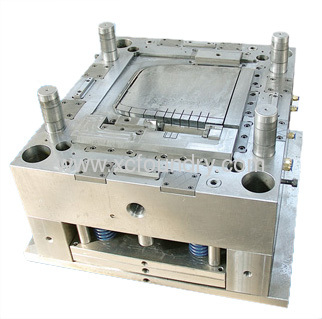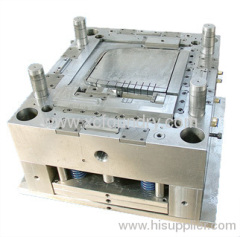
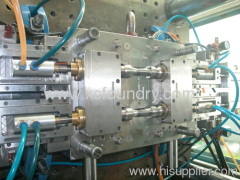
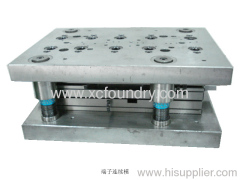
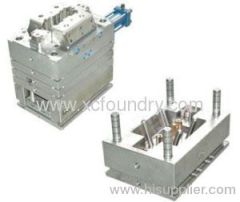
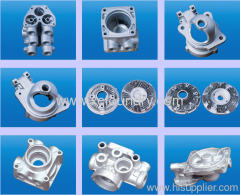
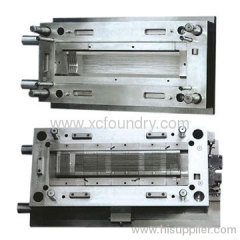
tooling matrix pattern die
1.0~2.0 USD
| Min. Order: | 1 Set/Sets |
|---|---|
| Trade Term: | FOB |
| Payment Terms: | L/C, T/T |
| Supply Ability: | 200 sets/month |
| Place of Origin: | Shandong |
Company Profile
| Location: | Qingdao, Shandong, China (Mainland) |
|---|---|
| Business Type: | Manufacturer |
| Main Products: | Foundry Machinery Molding Machine, Foundry Machinery And Equipment, Sand Blast Machine, Steel Surface Cleaning, The Core Making Equipments |
Product Detail
| Model No.: | tooling matrix pattern die |
|---|---|
| Means of Transport: | Ocean, Air, Land |
| Brand: | XICHENG |
| Production Capacity: | 200 sets/month |
| Packing: | yes |
| Delivery Date: | 25 days |
Product Description
Moldmoulddietooling matrixpattern
Metal molds
Mold according to the machining of metals processing classification, commonly used are:
Stamping die, stamping die, bending die, drawing die, flanging die, necking die, the ups and downs of mold, bulging mold, plastic mold;
Forging die, including forging the forging die, upset forging die; and the extrusion die and die-casting mold.
For processing non-metallic and powder metallurgy mold according to the processing object naming and classification of plastic mold, rubber mold and powder metallurgy mold.
A stamping die for sheet metal stamping and separation of the mold. Forming the mold cavity, the separation of the mold edge. The most commonly used stamping die, only one station, completion of a production process. Widespread application of this mold, simple structure, easy to manufacture, but the production efficiency is low. To improve productivity, multi-channel stamping processes, such as blanking, deep drawing, punching, trimming and other arrangements in the same mold, so that the blank to complete multi-channel stamping process on the same station, the mold is called the compound die . Another blanking, bending, deep drawing, punching and trimming and other work arrangements in the different position of the same mold, the mold is called a progressive die (also known as the modulus of continuity).
2 forging die for the thermal state metal forging mold. Forging, the billet is often After several rounds of deformation can be made from forgings, which requires several cavity carved in a single module. The metal in turn sent to each cavity, and plastic flow in the cavity, and finally filled the cavity made from forgings. In the forging, the billet is difficult to finish forging cavity volume equal to the blank selection is slightly larger in order to avoid waste. To this end, the final forging die around the cavity of the lower die interface has a flash tank to the storage of excess metal, forming the cut edge will fly. Should minimize sharp corners, deep grooves in the cavity, in order to facilitate metal plastic flow and filling, reduce mold wear and cracking, improve die life.
. Extrusion die used to mold the metal extrusion. Are extrusion die punch of a stationary die and the extrusion cylinder and exerting pressure on the blank placed billets. Extruded hollow pieces, the front of the punch with the mandrel. Anti-extrusion cylinder of the extrusion die to die, the punch into the punch. The metal needs under great pressure from the die extrusion, the required pressure in the cold state up to 2000 kN / mm (200 kg / mm). To this end, the extrusion barrel and the die backward extrusion needs to have a high intensity, often multi-prestressed composite structure. Punch and punch length should be short to avoid the occurrence of instability in the high compressive stress and bending.
4 die-casting mold is installed in the die casting machine, the liquid metal under high pressure into the cavity, holding pressure to the metal solidification and forming mold. It is mainly used for aluminum, zinc, copper, steel can also be used. Die-casting mold structure is similar to plastic injection mold. It consists of dynamic model with the fixed mold cavity, the formation of the casting core hole cavity. The metal in the cavity cooling, the solidified out of the core separated from the mold, casting introduced by the ejector. Die castings general thin-walled hollow, there are many sets of ribs, the shape of the complex structure, and size requirements are more accurate than the smooth surface, metal forming in the high temperature of melting. Die-casting mold using a high-temperature materials.
(5) powder metallurgy mold solid metal powder is press-formed mold. Metal powder quantitatively poured into the mold, then the upper die is closed, forming, and then the top feeding device to the top of the preform. The preform into the sintering furnace sintering was made of powder metallurgy parts. General powder metallurgy gap is large, about 15% of the total volume of the forming pressure is not, the mold structure is relatively simple, accuracy, surface roughness requirements in general, so no special requirements on the mold. In order to reduce the gap to improve the density and strength, sintered blank, and then once hot forging, known as powder forging. Mold and forging die with similar
Mold according to the machining of metals processing classification, commonly used are:
Stamping die, stamping die, bending die, drawing die, flanging die, necking die, the ups and downs of mold, bulging mold, plastic mold;
Forging die, including forging the forging die, upset forging die; and the extrusion die and die-casting mold.
For processing non-metallic and powder metallurgy mold according to the processing object naming and classification of plastic mold, rubber mold and powder metallurgy mold.
A stamping die for sheet metal stamping and separation of the mold. Forming the mold cavity, the separation of the mold edge. The most commonly used stamping die, only one station, completion of a production process. Widespread application of this mold, simple structure, easy to manufacture, but the production efficiency is low. To improve productivity, multi-channel stamping processes, such as blanking, deep drawing, punching, trimming and other arrangements in the same mold, so that the blank to complete multi-channel stamping process on the same station, the mold is called the compound die . Another blanking, bending, deep drawing, punching and trimming and other work arrangements in the different position of the same mold, the mold is called a progressive die (also known as the modulus of continuity).
2 forging die for the thermal state metal forging mold. Forging, the billet is often After several rounds of deformation can be made from forgings, which requires several cavity carved in a single module. The metal in turn sent to each cavity, and plastic flow in the cavity, and finally filled the cavity made from forgings. In the forging, the billet is difficult to finish forging cavity volume equal to the blank selection is slightly larger in order to avoid waste. To this end, the final forging die around the cavity of the lower die interface has a flash tank to the storage of excess metal, forming the cut edge will fly. Should minimize sharp corners, deep grooves in the cavity, in order to facilitate metal plastic flow and filling, reduce mold wear and cracking, improve die life.
. Extrusion die used to mold the metal extrusion. Are extrusion die punch of a stationary die and the extrusion cylinder and exerting pressure on the blank placed billets. Extruded hollow pieces, the front of the punch with the mandrel. Anti-extrusion cylinder of the extrusion die to die, the punch into the punch. The metal needs under great pressure from the die extrusion, the required pressure in the cold state up to 2000 kN / mm (200 kg / mm). To this end, the extrusion barrel and the die backward extrusion needs to have a high intensity, often multi-prestressed composite structure. Punch and punch length should be short to avoid the occurrence of instability in the high compressive stress and bending.
4 die-casting mold is installed in the die casting machine, the liquid metal under high pressure into the cavity, holding pressure to the metal solidification and forming mold. It is mainly used for aluminum, zinc, copper, steel can also be used. Die-casting mold structure is similar to plastic injection mold. It consists of dynamic model with the fixed mold cavity, the formation of the casting core hole cavity. The metal in the cavity cooling, the solidified out of the core separated from the mold, casting introduced by the ejector. Die castings general thin-walled hollow, there are many sets of ribs, the shape of the complex structure, and size requirements are more accurate than the smooth surface, metal forming in the high temperature of melting. Die-casting mold using a high-temperature materials.
(5) powder metallurgy mold solid metal powder is press-formed mold. Metal powder quantitatively poured into the mold, then the upper die is closed, forming, and then the top feeding device to the top of the preform. The preform into the sintering furnace sintering was made of powder metallurgy parts. General powder metallurgy gap is large, about 15% of the total volume of the forming pressure is not, the mold structure is relatively simple, accuracy, surface roughness requirements in general, so no special requirements on the mold. In order to reduce the gap to improve the density and strength, sintered blank, and then once hot forging, known as powder forging. Mold and forging die with similar
According to the different materials forming the mold can be divided into metal molds and non-metallic mold. The metal mold is divided into: plastic mold of the casting mold (die-casting, steel casting), forging dies, etc.; non-metallic mold is also divided into: non-ferrous metals and inorganic non-metallic mold. While the in accordance with the different of the mold itself materials of the, the mold can be be divided into: sand mold mold, metal mold, vacuum mold, paraffin wax mold, and so on. With the rapid development of polymer plastic, the plastic mold with people's lives are closely related. Plastic mold generally can be divided into: injection mold, extrusion mold, gas-assisted mold.
